Iran nuclear deal: Trump 'will not sign off agreement'
- Published
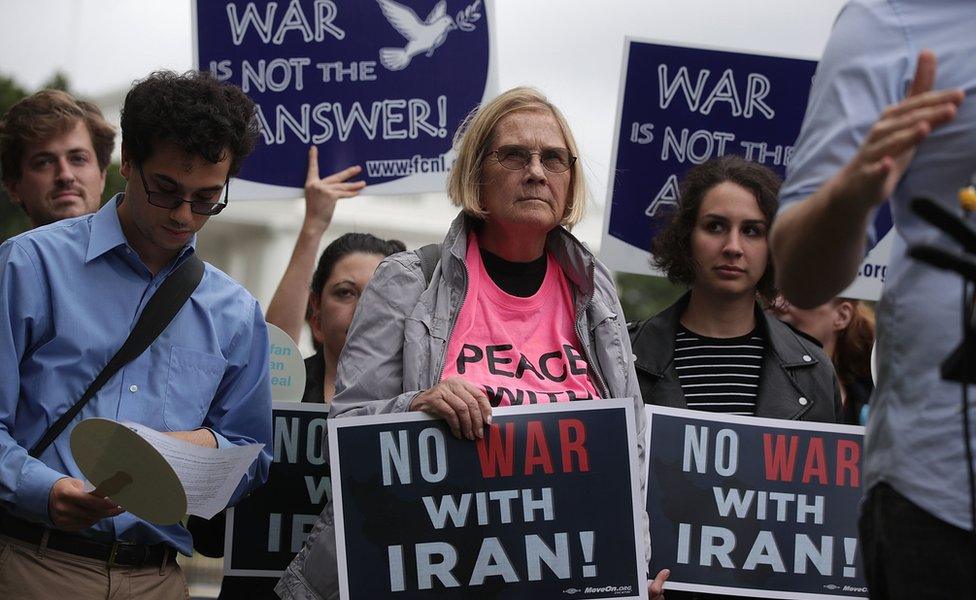
Protesters outside the White House have urged Donald Trump to back the deal
US President Donald Trump will accuse Iran of failing to comply with an international nuclear deal, according to Secretary of State Rex Tillerson.
Mr Trump will refuse to certify the deal and refer it to Congress, he told reporters.
Such a move would not mean a US withdrawal from the deal that freezes Iran's nuclear programme, but it is part of a tougher strategy on Iran.
President Trump was due to speak from the White House at 16:45 GMT.
He is under pressure at home and abroad not to scrap the seven-country deal agreed in 2015, under which Iran has halted its nuclear programme in return for the partial lifting of sanctions.
In his speech, Mr Trump is expected to accuse Tehran of pursuing "death and destruction".
It is thought he will also focus on its non-nuclear activities, particularly those of the Revolutionary Guards (RIG), which has been accused of supporting terrorism.
What exactly is Mr Trump proposing?
During the presidential election campaign in 2016, Mr Trump pledged to throw out the agreement concluded under his predecessor, Barack Obama.
But senior cabinet officials advised him not to as Iran was abiding by its terms, so Mr Trump has opted for a middle road, reports the BBC's Barbara Plett Usher in Washington.
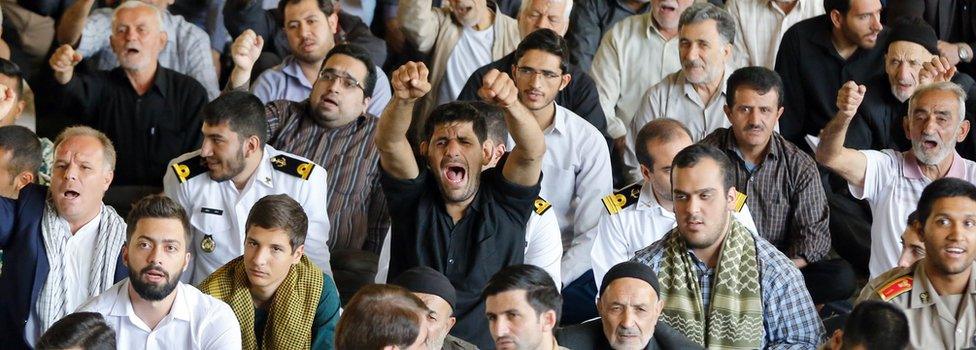
Worshippers shouted anti-US slogans during Friday prayers in Tehran
Mr Trump was due to say the agreement did not meet certain conditions of US law, but he would let Congress decide its fate, Mr Tillerson said.
Congress could choose to pull out of the deal, but Mr Tillerson said the administration would advise it instead to establish guidelines under which the US could automatically re-impose sanctions: trigger points, he called them.
The Trump administration wants to broaden Iran policy beyond the nuclear deal. This, said Mr Tillerson, would include sanctioning members of the powerful Revolutionary Guards force for supporting militant groups and terrorist activities.
What does the Trump administration want to change about the deal?
Among the changes it is seeking is the end to the "sunset" clauses in the deal, one of which sees restrictions on Iran's nuclear enrichment programme lifted after 2025, greater access to nuclear sites and the inclusion of Iran's ballistic missile programme.
A timeline of what Trump's said about the Iran deal
Why is Trump speaking now?
Under the Iran Nuclear Agreement Review Act (Ingra), Congress requires the US president to certify every 90 days that Iran is upholding its part of the nuclear agreement.
Mr Trump has already recertified it twice and has a deadline of Sunday to make his latest report back.
Refusal to recertify would give Congress 60 days to decide whether to pull out of the nuclear deal by re-imposing sanctions.
What is the background to this tougher stance?
A strategy paper, external released by the White House highlights calls for neutralising Iran's "destabilising influence and constraining its aggression, particularly its support for terrorism and militants".
The US, it says, will work to revitalise traditional alliances and regional partnerships as "bulwarks against Iranian subversion".
President Trump and Iran's President Rouhani traded insults at the UN
Efforts will be made to deny funding for the Iranian government and the RIG's "malign activities" and counter threats from ballistic missiles "and other asymmetric weapons".
The nuclear deal does not comprehensively cover the missile development programmes, and last month Iran successfully tested a new-medium range missile with a 2,000km (1,200-mile) range.
The IRGC's "gross violations of human rights" will be highlighted to the rest of the world," the strategy paper says.
"Most importantly, we will deny the Iranian regime all paths to a nuclear weapon."
What do other key players say?
Foreign leaders, including UK Prime Minister Theresa May and French President Emmanuel Macron, have urged Mr Trump to keep the deal.
"We also have to tell the Americans that their behaviour on the Iran issue will drive us Europeans into a common position with Russia and China against the USA," German Foreign Minister Sigmar Gabriel warned in a newspaper interview.
Kremlin spokesman Dmitry Peskov said that US withdrawal from the nuclear deal would "damage the atmosphere of predictability, security, stability and non-proliferation in the entire world".
Former Swedish Prime Minister Carl Bildt said a US withdrawal from the deal would show it could not be relied upon and could have ramifications elsewhere, for example on efforts to resolve the North Korean nuclear issue.
The IAEA and Congress currently both agree Iran is complying with the terms of the nuclear agreement.
What is Iran's position?
The speaker of the Iranian parliament, Ali Larijani, said on a visit to Russia that a US withdrawal from the deal would signal its end.
He warned that the collapse of the deal could result in global chaos, Russian media report.
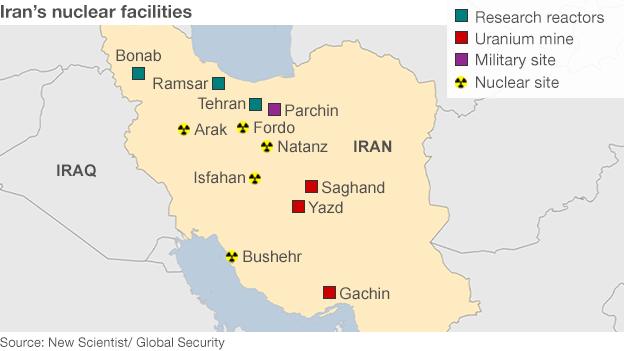
What is the nuclear deal?
Formally known as the Joint Comprehensive Plan of Action, it is designed to prevent Iran developing a nuclear weapon.
It lifted some sanctions that stopped Iran from trading on international markets and selling oil.
The lifting of sanctions is dependent on Iran restricting its nuclear programme. It must curb its uranium stockpile, build no more heavy-water reactors for 15 years and allow inspectors into the country.
Who are the Revolutionary Guards?
Set up shortly after the 1979 Iranian revolution to defend the country's Islamic system, they provide a counterweight to the regular armed forces.
They are a major military, political and economic force in Iran, with some 125,000 active members, and oversee strategic weapons.
They have been accused of supporting Shia Muslim militants in Lebanon, Yemen, Iraq and Syria.
- Published22 September 2017
- Published3 October 2017
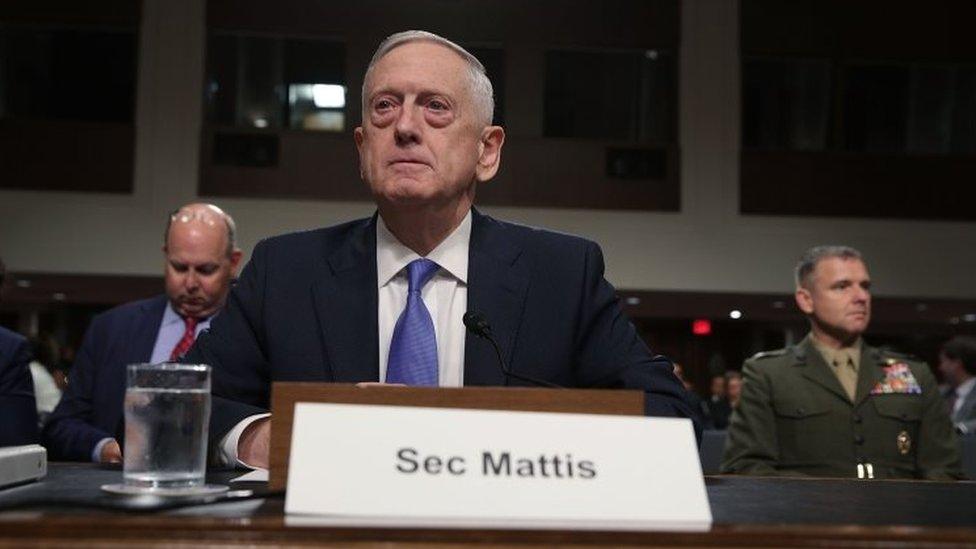
- Published17 May 2017
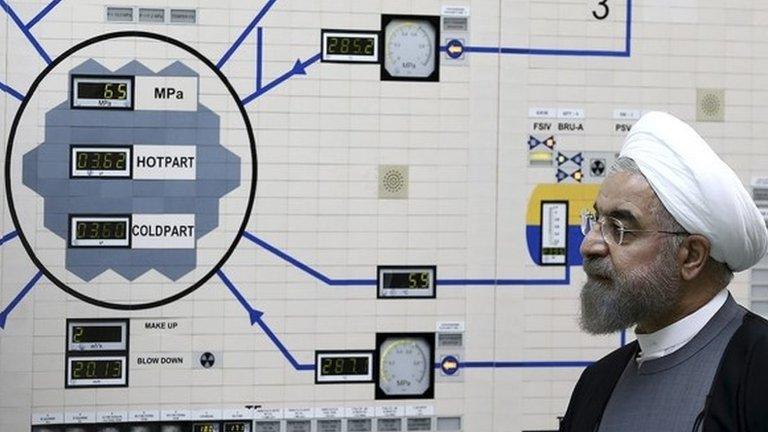
- Published22 May 2017